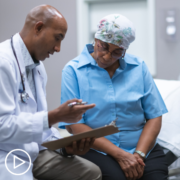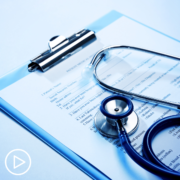Empowering Lung Cancer Patients | Embracing Hope, Treatment, and Teamwork
Empowering Lung Cancer Patients: Embracing Hope, Treatment, and Teamwork from Patient Empowerment Network on Vimeo.
What does the future of non-small cell lung cancer (NSCLC) treatment and care look like? Expert Dr. Samuel Cykert from UNC School of Medicine shares his outlook about the future of care and his advice to patients to help build emotional support.
[ACT]IVATION TIP
“…don’t give up, and one thing I’ve heard from patients over time, particularly among Black patients, there’s a tremendous faith community, and understanding that tremendous faith, faith is excellent, but also use that faith to understand that your belief in God, your interaction with God, God is using those doctors and those healthcare professionals to help you, so it’s not a solo effort, get everybody on the team.”
Download Resource Guide | Descargar guía de recursos
See More from [ACT]IVATED Non-Small Cell Lung Cancer
Related Resources:

|

Improving Biomarker Testing Access for Rural Lung Cancer Patients |

How Can We Advance Equitable Access to Precision Medicine in Lung Cancer Care? |
Transcript:
Lisa Hatfield:
If you could give one suggestion to patients out there who may not be following up with their appointments, perhaps also in addition to the racial disparities? The unfortunate stigma surrounding lung cancer, and I wonder sometimes if that’s a barrier to continuing treatments or going to appointments, you could give one suggestion or sentence of encouragement to patients to seek out those high volume facilities if they’re diagnosed, if there’s a suspicion of lung cancer and to continue with treatment, what would your message be to those patients?
Dr. Samuel Cykert:
My message to patients, really it’s two-fold. On the medical side, lung cancer deaths are falling, all cancer deaths are falling, and they’re falling because of earlier detection, but they’re also falling because of these new treatments. And so it’s really, really important, particularly if you’re physically able, if you have a good functional status and you’re able to walk around and do things, it’s important that you really, really consider aggressive treatments because lung cancer isn’t an immediate death sentence anymore.
It is true that there are some lung cancers that are not curable, but with some of the new biologic treatments and chemotherapy regimens, people can live years with a good quality of life, even with some advanced lung cancers. So my advice on that side is don’t give up, and one thing I’ve heard from patients over time, particularly among Black patients, there’s a tremendous faith community, and understanding that tremendous faith, faith is excellent, but also use that faith to understand that your belief in God, your interaction with God, God is using those doctors and those healthcare professionals to help you, so it’s not a solo effort, get everybody on the team.
Lisa Hatfield:
Great message. Everybody on the team, I like that. Thank you, Dr. Cykert, and I appreciate all of your answers, and I’m hoping that this message, what people are watching that, understanding those statistics from your research, people who sometimes miss appointments or have transportation issues, maybe this will inspire them to continue finding ways to get there and to keep going, to keep fighting it and getting everybody on their team, I appreciate your message a lot. Thank you.
Share Your Feedback
Create your own user feedback survey



